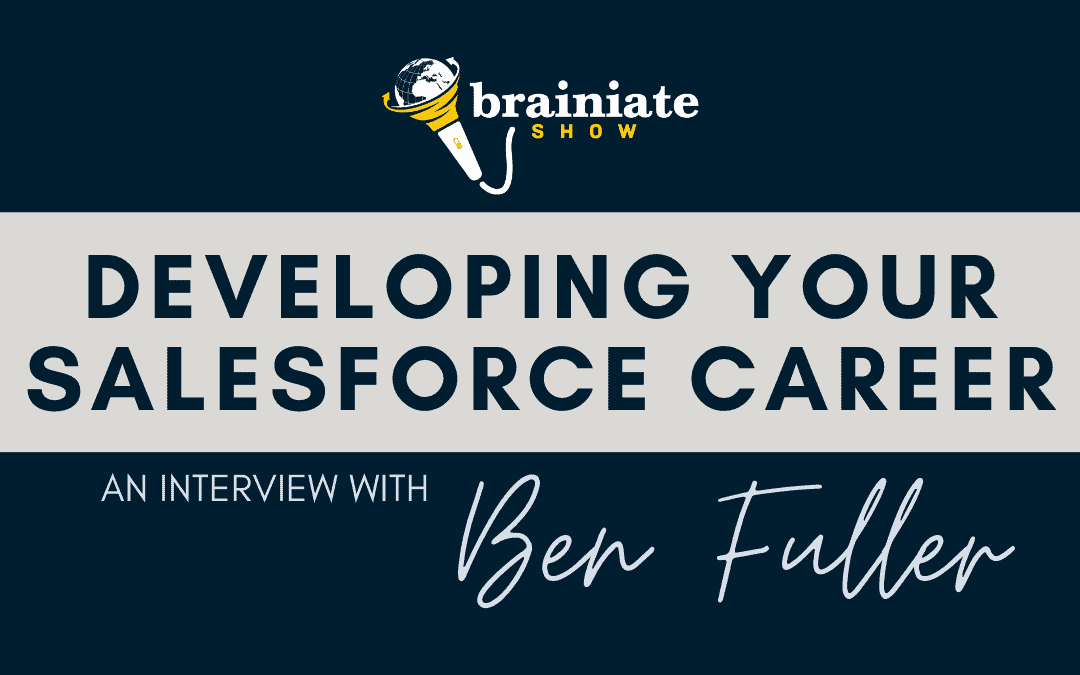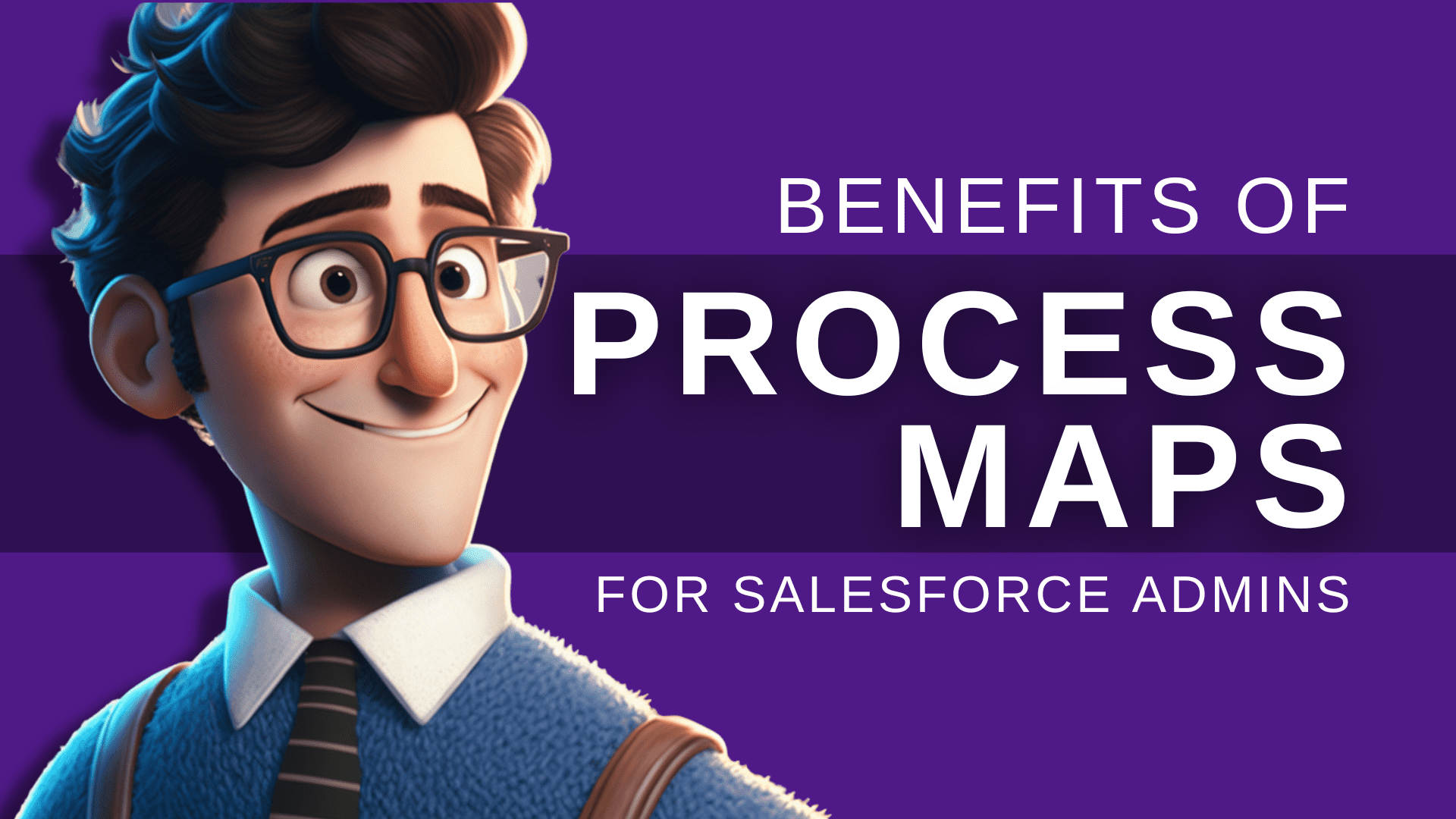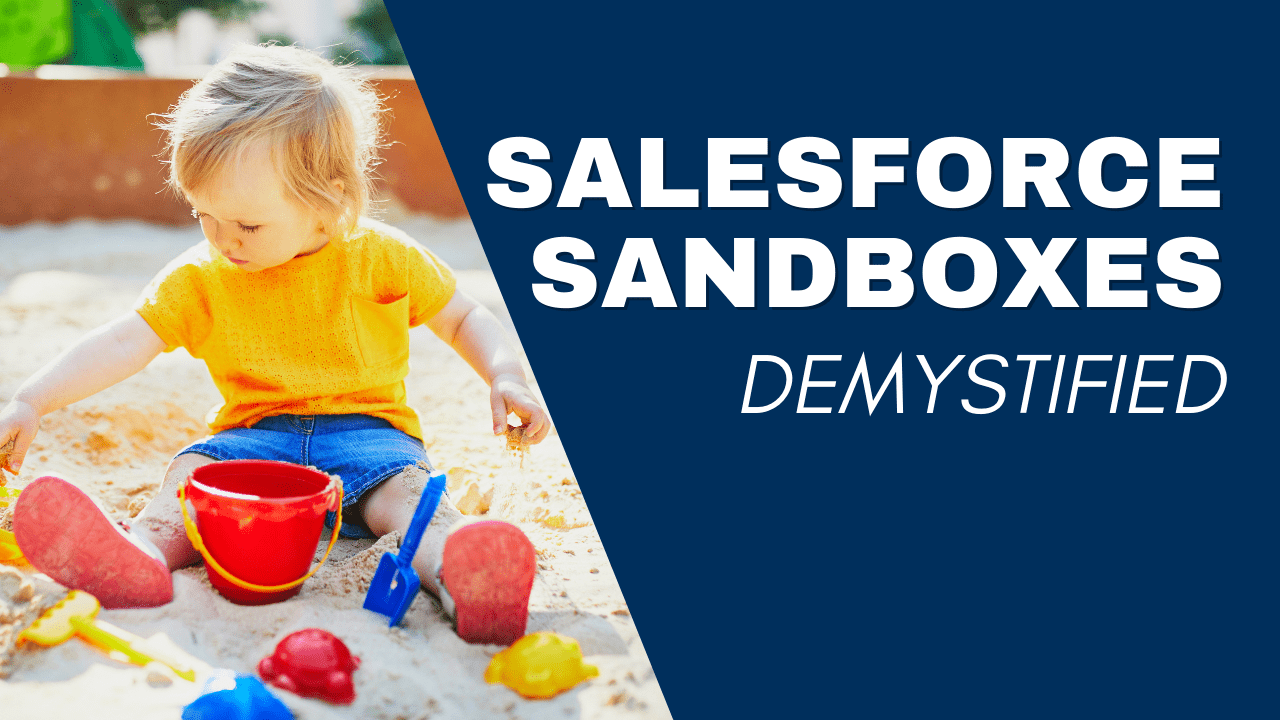Developing Your Salesforce Career With Ben Fuller

You are the CEO of your career. You need to keep up with Salesforce skills and knowledge, but you have a full-time job, family responsibilities, and hobbies you want to pursue, so it’s hard to know where to start.
In this episode of the Brainiate Show, Ben Fuller shares his best advice to help you make the most out of your Salesforce career. Ben has seen his fair share of challenges within the Salesforce industry.
Listen now!
What Is Salesforce and How It Can Help You
Salesforce is a CRM platform, that is typically highly customized based on the needs of any organization. It is known for helping companies hit their quotas quickly, resulting in a fast turnaround of leads to sales.
Because so many businesses are now using the Salesforce platform, there are a variety of career alternatives open to individuals with Salesforce skills in all sectors. To utilize your Salesforce skills to the fullest extent possible, you have to have a plan for both using them at work and building on them over time.
Why Managing Your Salesforce Career Matters
Salesforce skills are in demand. It is not just your current employer who wants you to be growing your Salesforce skill set; other companies are looking for people with Salesforce experience on their teams too. It is easier than ever before to find great jobs that will help you grow in your Salesforce career.
Salesforce certifications are worth it for individuals who use the platform at their jobs, or plan on using it in the future.
Certifications validate your existing skills and prove what you know when applying for new positions. When they are implemented into your professional development plan, certifications can help you take your Salesforce career to the next level.
However, just having Salesforce certifications is meaningless. It’s important to have a personal plan for how you can grow within the Salesforce ecosystem.
Having a self-development plan will help you utilize your existing skills better, but also give you an idea of what weaknesses need to be covered in order to grow professionally.
Who This Post Is For
This post is for Salesforce professionals who want to take their career to the next level. It’s also for those Salesforce professionals who have been at their jobs for a while and are looking to see what could be improved.
What Are the Benefits of Developing a Personal Roadmap for Self-Development in Salesforce
By having a plan for self-development in Salesforce, you will have an idea of what skills you need to learn and why. This road map can help you prioritize your learning and understand where your strengths and weaknesses are as it pertains to the Salesforce ecosystem.
How to Develop a Personal Roadmap for Your Salesforce Career
It is important to have a plan for learning new skills, both for you and your employer. You should always be learning something new, whether that’s through taking online courses, attending conferences or just picking up books to read on the topic. There are multiple ways you can keep yourself fresh in this field . If you’re just starting out in your Salesforce career, you will need to take a more hands-on approach because you haven’t been exposed to all the features.
In order to have a good roadmap for self-development, you should utilize assessments that can help determine what skills are most lacking or where you can improve your knowledge and experience in general.
It’s important to remember that regardless of the role you have within any organization, developing the following soft skills will help you stand apart from your peers:
- Emotional Intelligence – Your EQ is how in tune you are with your own emotions, as well as the emotions of others. People who have a high EQ know how to handle conflict and communication respectfully. They can take criticism without reacting emotionally and work well in teams .
- Empathy – Being able to empathize with someone will allow you to understand what they’re going through. This will help you solve their problems by using your Salesforce skills, as well as increase the level of trust between you and your client. These soft skills can be learned through effective communication and listening. If you find that these are lacking in your skill set, take time to improve on them so they become second nature when you interact
- Communication – Communication is one of the most important aspects to being successful in a Salesforce career. Being able to communicate your ideas and opinions, as well as listen to those around you will help you improve projects and strengthen client relationships.
- Written Communication – In today’s business-driven world, it’s important that professionals know how to write clear copy that gets their intended message across. In the Salesforce ecosystem, this is especially critical because you will be communicating a lot through your written copy, whether it’s through email or documentation.
- Public Speaking – Public speaking helps build confidence and leadership abilities . It can also help hone your communication skills. Being able to communicate a complex idea in a simple manner is a valuable skill. If you struggle with public speaking or want to improve your communication, take some time to practice and present at conferences.
- Networking – Building meaningful relationships is an essential part of building a strong Salesforce career. Try meeting people at conferences and taking them out for coffee after the event. Don’t forget about those who have helped you in the past, but don’t overdo it.
- Teamwork & Respect – Working well with others is an important part of Salesforce success. Be sure to show respect to your coworkers and those above you in the company structure, as well as those around you in the community who are working towards similar goals.
- Taking Responsibility – You will need to take responsibility for reading Salesforce documentation, staying up-to-date on the newest Salesforce features and methods, as well as completing your own personal development.
- Flexibility & Creativity – You will need to be creative with your Salesforce career. You don’t have to follow the same path as others who are in your position, so make sure you’re willing to try new things and think outside of the box to keep yourself excited about learning.
- Leadership – Being able to lead the projects you are on will require some creativity, but it can also be very rewarding. You will need strong communication skills in order to be successful at leading team members towards a common goal.
- Learning New Things – Learning new things is an important part of Salesforce success. Finding what aspect of Salesforce interests you most and then learning as much as you can about that topic will help your career continue to grow. Finding a mentor who is willing to share their knowledge of Salesforce with you will also help accelerate this growth.
- Time Management & Organization – Time management and organization is essential when you’re in a Salesforce career. You will need to stay on top of your day-to-day tasks, but you will also need to plan out the future with goals and learnings from previous projects. Doing so can help quickly grow your Salesforce knowledge and measure your contributions.
- Motivation & Work Ethic – Being motivated and having a strong work ethic are both very important when it comes to Salesforce success. You’ll need to be able to motivate yourself and your team members in order to keep up with deadlines and project timelines. Having a strong work ethic will ensure that you’re always completing tasks and making the most of your time.
What should be included in a personal roadmap for developing your Salesforce career?
Your career roadmap should include a combination of short term and long term goals. You should have some milestones that you would like to achieve over the next few months, as well as some long-term goals that will be worked on over a more extended period of time.
In order for this plan to work, your roadmap needs to be specific. If you have a vague idea of what your goals are, then there will be nothing driving you to learn new things.
Your plan should involve a variety of different types of learning. You can’t just focus on technical aspects if you want to truly grow as a Salesforce professional. It’s important to have strategic plans for how you can grow your Salesforce career.
What are some examples of goals that you should have in your personal plan for development?
There are two sets of goals-personal and professional.
Your personal goals can be things like exercising more, volunteering for a local nonprofit, or learning how to cook new foods.
On the other hand, you should also have professional goals.
These will vary based on your skillset, but could be something like getting Salesforce certified or learning new platform features.
When writing your roadmap it is important to include both types of goals.
What are some ways that you can make sure you are on track for success in your personal roadmap for growing your Salesforce career?
It’s important to stay accountable for the goals that you set. You should work with friends and colleagues to make sure you are on track for success. Setting up check-ins is a great way to make sure progress is being made, and it can be extra helpful if those people know what your career roadmap is and how they can help you stay on track.
Although this plan will require you to self-reflect and find weaknesses, it doesn’t mean that you need to do everything by yourself. There are Salesforce professionals in your network who can help you today. Make sure to utilize the community at events like Dreamforce, World Tours, local community group meetups, Salesforce Saturdays and online through Twitter and LinkedIn groups.
Conclusion
The Salesforce career is a complex and evolving space. One of the most important things you can do for yourself as an individual on this journey is to develop your own personal roadmap-a plan for self-development that you can follow. It also includes being aware of what skills you need to acquire in order to move forward within the company at which you work. In this article, we’ve given some advice about how to go about doing so with specific goals, milestones, and strategies for success along the way.






